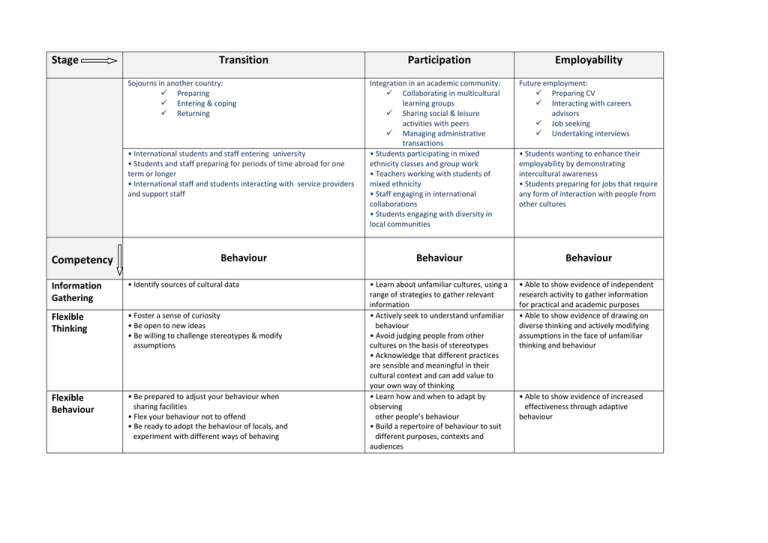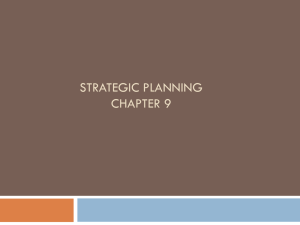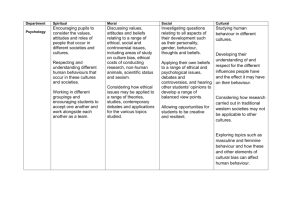Stage Transition Participation Employability
advertisement

Stage Transition Sojourns in another country: Preparing Entering & coping Returning • International students and staff entering university • Students and staff preparing for periods of time abroad for one term or longer • International staff and students interacting with service providers and support staff Competency Behaviour Information Gathering • Identify sources of cultural data Flexible Thinking • Foster a sense of curiosity • Be open to new ideas • Be willing to challenge stereotypes & modify assumptions Flexible Behaviour • Be prepared to adjust your behaviour when sharing facilities • Flex your behaviour not to offend • Be ready to adopt the behaviour of locals, and experiment with different ways of behaving Participation Integration in an academic community: Collaborating in multicultural learning groups Sharing social & leisure activities with peers Managing administrative transactions • Students participating in mixed ethnicity classes and group work • Teachers working with students of mixed ethnicity • Staff engaging in international collaborations • Students engaging with diversity in local communities Behaviour • Learn about unfamiliar cultures, using a range of strategies to gather relevant information • Actively seek to understand unfamiliar behaviour • Avoid judging people from other cultures on the basis of stereotypes • Acknowledge that different practices are sensible and meaningful in their cultural context and can add value to your own way of thinking • Learn how and when to adapt by observing other people’s behaviour • Build a repertoire of behaviour to suit different purposes, contexts and audiences Employability Future employment: Preparing CV Interacting with careers advisors Job seeking Undertaking interviews • Students wanting to enhance their employability by demonstrating intercultural awareness • Students preparing for jobs that require any form of interaction with people from other cultures Behaviour • Able to show evidence of independent research activity to gather information for practical and academic purposes • Able to show evidence of drawing on diverse thinking and actively modifying assumptions in the face of unfamiliar thinking and behaviour • Able to show evidence of increased effectiveness through adaptive behaviour Rapport Building • Initiate contact and show interest in people from unfamiliar cultures • Develop connections with locals on a personal level • Exhibit warmth & friendliness • Maintain and extend working relationships • Be willing to focus on long-term trustbuilding • Do not rely on the others’ language skills • Do not feel too self-conscious about your language proficiency • Do not let your language proficiency hold you back from contributing • Able to show evidence of establishing sustainable relationships across cultures Language Learning • Invest in learning words and phrases in other languages • Try out expressions and words when communicating with locals • Practise your language skills with native speakers Making Yourself Understood • Adapt use of language to the proficiency level of the recipient(s) to maximise comprehensibility • Explain clearly to local people what you need and why you need it • Actively clarify your own contribution • Be prepared to share the thought process behind your intentions • Adjust speed, complexity and selection of language to suit needs of interlocutor • Able to show evidence of successful modification of communication to achieve understanding in a challenging context Attentive Listening • Listen actively to what the other is trying to say • Double-check that you have understood what local people want you to do • Pay attention to non-verbal signals • Check and clarify rather than assuming understanding • Pay close attention to how people from other cultures differ in their body language • Develop ability to anticipate and handle potential misunderstanding • Able to show evidence of active listening and to provide examples of successful and more challenging interactions Self-Awareness • Recognize that others may see you and treat you as a foreigner • Be aware of how you come across to others • Use diversity as a mirror to explore your own cultural identity • Observe how your style impacts on group dynamics • Reflect on how you may be perceived by people from other backgrounds when you are behaving ‘normally’ • Able to show evidence of what you have learnt about yourself from working internationally • Able to show evidence of acquisition and use of (new) language skills for performance Personal Strength • Develop strategies to cope with difficult situations and the stress that comes with living in a foreign environment • Remember the benefits and opportunities for personal growth that come with overcoming adversity • Remain positive even when you encounter problems or failure • Retain a sense of inner purpose – try to be flexible, but ‘stand your ground’ when it is necessary • Adhere to your values and provide a sense of direction for yourself and others • Able to show evidence of resilience in adversity • Able to maintain a balance between flexibility and personal values Spirit of Adventure • Develop a positive attitude to new experiences • Be adventurous and try something new on a regular basis • Be ready to deal with ambiguous situations • Develop tolerance of ambiguity • Enjoy the opportunity to work in diverse groups with different perspectives • Able to show evidence of successful risk-taking in uncertain, unpredictable or challenging situations INTERCULTURAL COMPETENCY FRAMEWORK DEVELOPED FOR USE WITH UNIVERSITY STUDENTS AND STAFF Centre for Applied Linguistics, University of Warwick, 2010 Development of this material was undertaken as part of a project funded by the Higher Education Council for England All materials on this website are the copyright of the Global People team. All rights reserved. No part of this website and its resources may be published without the prior written consent of the copyright holders. Any materials used for presentation or teaching purposes must give full acknowledgement to the copyright holders.



